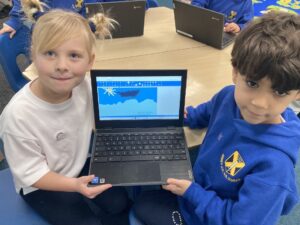The photos above show Year 5 filming weather reports with a focus on camera angles/filming techniques.
‘A high-quality computing education equips pupils to use computational thinking and creativity to understand and change the world. Computing has deep links with mathematics, science, and design and technology, and provides insights into both natural and artificial systems. The core of computing is computer science, in which pupils are taught the principles of information and computation, how digital systems work, and how to put this knowledge to use through programming.’
The Primary National Curriculum Framework 2014
Aims
At Abbey CE VA Primary School, our aim is to prepare pupils for their future in an increasingly digital world. We strive to develop computational thinking skills, digital literacy, and a thorough understanding of how technology works. Our curriculum aims to create confident, capable and creative users of technology who can understand, create and debug programs, use technology safely and responsibly, and apply their computing skills across the curriculum. We believe that computing skills are essential for future learning and employment, enabling pupils to become active participants in the digital world.
How We Teach Computing
Our approach to teaching computing is practical and engaging, built around three core strands (from the National Centre for Computing Education): computer science, information technology, and digital literacy. Lessons are delivered in classrooms using Chrome Books and through the use of technology across other subjects. Teachers demonstrate specific skills and concepts, while encouraging pupils to explore and problem-solve independently.
We use a range of teaching tools including more advanced programming platforms in Key Stage 2. Online safety is embedded throughout our teaching, ensuring pupils learn to use technology responsibly and safely. Teachers assess pupils’ progress through practical tasks, project work, and discussions about computing concepts.
Pupils have regular access to appropriate hardware and software to support their learning. We create opportunities for pupils to apply their computing skills across the curriculum, from data handling in mathematics to research in history. Where possible, we make links with technology professionals and participate in computing initiatives to inspire our pupils.
What Skills and Knowledge Will Your Child Learn?
Throughout their time at Abbey, pupils develop a comprehensive range of computing skills and knowledge. In the early years, children learn basic digital literacy through using simple programs and devices. They begin to understand that computers follow precise instructions and start to develop logical thinking skills.
As they progress, pupils develop more sophisticated computing skills and understanding. They learn to:
Computer Science:
- Understand and create simple algorithms
- Write and debug programs using various platforms
- Use logical reasoning to predict program behaviour
- Understand computer networks including the internet
- Recognise how digital systems work
Information Technology:
- Use search technologies effectively
- Select and use software for specific tasks
- Collect, analyse and present data digitally
- Create and manipulate digital content
- Save, retrieve and organise digital content
Digital Literacy:
- Use technology safely and respectfully
- Recognise acceptable/unacceptable online behaviour
- Keep personal information private
- Identify where to seek help with online concerns
- Evaluate digital content critically
By Upper Key Stage 2, pupils will have developed:
- Confident use of various programming languages
- Understanding of computer networks and systems
- Ability to create and debug complex programs
- Skills in using technology for a range of purposes
- Strong awareness of online safety and responsibility
- Capability to select appropriate digital tools
- Understanding of how technology impacts society
These skills and knowledge are built systematically year by year, ensuring pupils make consistent progress in their computing development. Our balanced approach ensures pupils become:
- Competent and confident users of technology
- Responsible digital citizens
- Creative problem solvers
- Logical thinkers
- Safe users of the internet
- Skilled programmers
Through our computing curriculum, pupils also develop important transferable skills including:
- Problem-solving and debugging
- Logical thinking and reasoning
- Creativity and innovation
- Digital communication
- Collaboration and teamwork
- Research and evaluation skills
We believe these skills are essential for pupils’ future success in an increasingly digital world, preparing them for secondary education and beyond. Our curriculum ensures pupils understand both how to use technology and how it works, creating digitally literate individuals who can participate fully in the modern world.
The photos below show Year 2 creating algorithms to test out with BeeBots.
Curriculum Overview
- Computing Curriculum Overview (597.84KB)
National Curriculum

Computing
The children have been developing their ICT skills by mastering the mousepad and exploring the creative tools on paintz.app to draw and write digitally. They’ve
